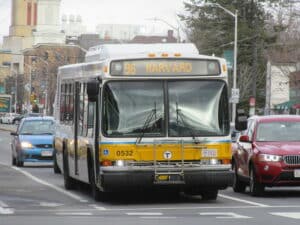Warning that the pace of electrification underway for the MBTA’s bus fleet is “too slow for the legislature,” a top senator is newly forecasting that his chamber plans to make the transportation sector a focus in upcoming climate legislation.
Sen. Michael Barrett, who co-chairs the Telecommunications, Utilities and Energy Committee, told leaders of the Baker administration’s transportation secretariat on Friday that he expects a forthcoming Senate bill will make another pass at requiring the T to transition its bus network to full electrification by a specific date.
MBTA officials are preparing for an all-electric-bus future and rolling more zero-emission vehicles into the fleet, but General Manager Steve Poftak told lawmakers the need for new charging stations and updated maintenance facilities poses a challenge, moreso than the actual purchase of non-fossil fuel vehicles.
The T should have a full suite of garages up and ready to handle an electric fleet in roughly the next 15 to 18 years, Poftak said.
“We’d like to do them faster. In order to do them faster, we’re going to need additional money,” he said at a Joint Ways and Means Committee hearing about Gov. Charlie Baker’s $48.5 billion fiscal 2023 state budget. “It’s approximately a $4.5 billion investment in electrified facilities.”
“I don’t think the legislature is going to wait 15 to 18 years to green the T fleet because we can’t get to our emissions goals, we can’t get 50 percent below 1990 levels in total statewide emissions, if we operate on those kinds of timeframes. It just doesn’t compute,” Barrett replied. “I can appreciate the complexity here, but that is not going to work.”
On Thursday, when asked about tax relief in the face of inflation and rising gas prices, Senate President Karen Spilka pivoted to incentives for people to utilize public transit and purchase electric vehicles.
“You’ve heard me talk about doing a climate bill, probably in April, that we will be and have planned on taking a good hard look at providing some relief and options in that area,” Spilka said.
Transportation sources produced about 42 percent of greenhouse gas emissions in Massachusetts in 2017, according to a December 2020 report, representing the largest share of any individual sector.
In 2020, the Senate voted to require the MBTA to begin purchasing only electric buses by 2030 for all new vehicles and then operate an entirely electrified fleet by 2040. That language did not survive talks with the House, Barrett said Friday, over what eventually became a major climate law setting a net-zero emissions reduction by 2050, including sublimits for transportation and five other sectors of the economy. Barrett called the law “a very useful climate act that was essentially mute on the greening of transportation.”
Barrett, a Lexington Democrat, said he expects lawmakers will look to revive their push for a mandate setting clear deadlines on transitioning the MBTA’s fleet of more than 1,000 buses away from fossil fuels.
“It’s this new purchase piece that is going to be the sensitive point,” he said. “I dare say there’s going to be a great deal of interest in both branches to do a transportation piece this time around. That key number is: what’s the year after which all purchases of T buses must be electric?”
The MBTA officially broke ground last month on a new bus facility in Quincy to replace an existing 104-year-old garage, boosting its capacity and allowing the location to host hybrid and battery-powered buses. Officials expect to overhaul an Arborway bus facility next.
“I would ask as the legislature ponders these issues to just be mindful of the relation between vehicles and the importance of facilities,” Poftak said. “If one were to replace our entire fleet with electric buses right now, we would not be able to properly – we don’t have the distribution, we don’t have the charging.”
The House last week approved legislation aimed at ramping up the state’s burgeoning offshore wind industry, and Senate leaders responded by indicating they had their sights set on a more comprehensive climate bill.
“I think the Senate will want to go wide and respond to the House initiative with legislation that certainly touches on offshore wind, but also touches on other areas,” Barrett said. “With respect to the T, there’s overwhelming demand within the T areas to see a firm date set by which or after which all purchases of T buses would have to be electric. They’re not going to choose 2038, I can promise you that.”




 |
| 


